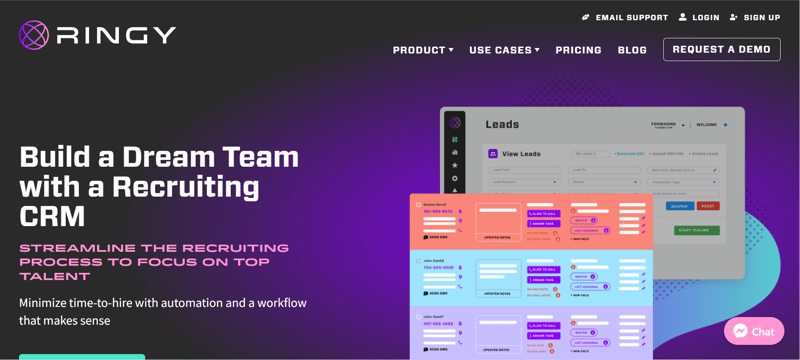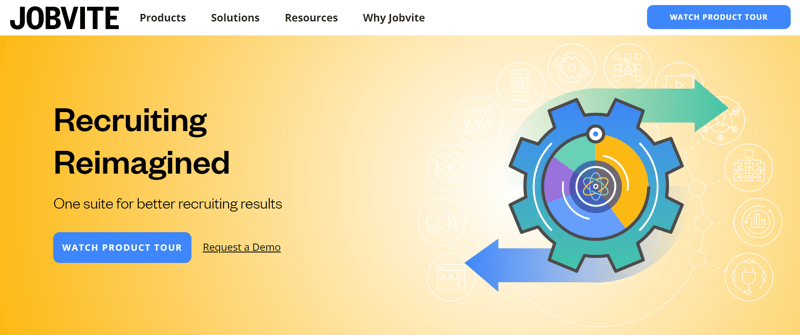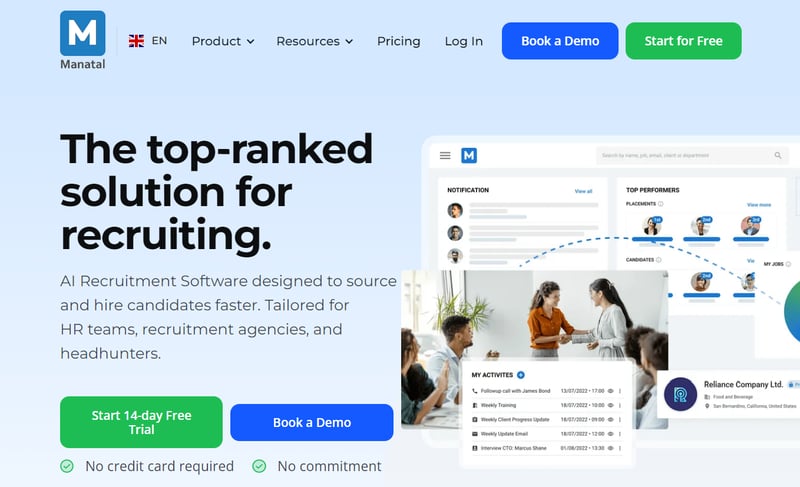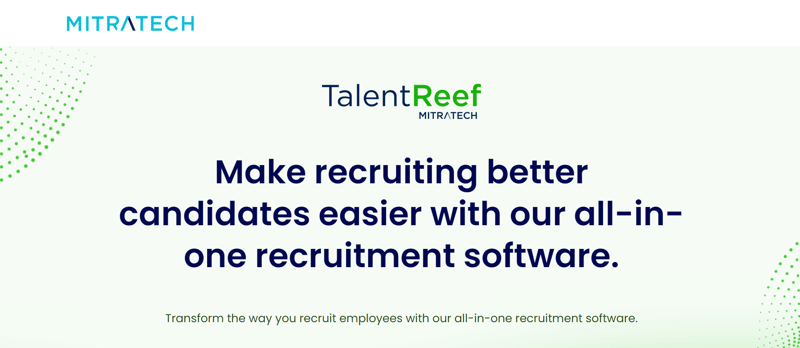
5 Benefits of a Recruitment CRM & Top 5 Software Picks
 Updated on
Updated on
 By Katie Bowman
By Katie Bowman
Katie Bowman
Katie has extensive experience in customer service and enjoys the opportunity to help others. She is committed to providing high-quality service and d...
learn more
Katie Bowman
Katie has extensive experience in customer service and enjoys the opportunity to help others. She is committed to providing high-quality service and d...
Table of Contents
Table of Contents
Every successful business, organization or company, knows the value of being more than the sum of its parts. It's not something you can bottle and sell on the free market, but if it was, you can bet it would fetch top dollar.
But there is a far less fanciful and cost-effective solution.
So creating a real sense of culture and being ethically aligned with a group of people that share a vision and a passion should be the goal of any recruiter.
That, as it turns out, is a little harder than it sounds for various reasons.
You would think that acquiring the right person for any given position would fall into the ‘duh' category of business strategies. But so many companies repeatedly dip their toes into shallow talent pools or are so inundated with low-quality applicants that they seldom end up with a good fit. As a result, employee turnover rates are at an all-time high, and they can be a sizeable monkey on the backs of businesses irrespective of their size or industry.
One of the most effective ways to attract the hires you deserve and to keep these metaphorical primates at bay is by optimizing your hiring processes with a recruitment CRM.
Now you might know a little about them. You might know nothing at all. But what you will know by the end of this article is why this type of software is awesome and merits your attention.
What is a Recruitment CRM?
Recruitment CRM (Candidate Relationship Management) software equips companies with the tools, metrics, and tracking systems they need to hire effectively and efficiently, saving them loads of time and money.
This software removes many of the arduous tasks associated with bringing in new people streamlining complex vetting practices, and improving applicant experiences.
Think of it as having your very own, highly qualified assistant that handles all the nitty-gritty aspects of recruitment that allows you to focus on the bigger picture and what that means for your business.
Recruitment CRM vs. Application Tracking System
One of the essential parts of investigating any software is understanding your acronyms.
A recruitment CRM and recruitment ATS clearly are very different things. How can you tell? They have different acronyms, obviously. But aside from that, there are a few other vital distinctions to make.
Let's say you advertise for a job. Within hours, your inbox is stacked with hundreds of applications from eager candidates.
How do you even start sorting through them?
An applicant tracking system (ATS) only starts working once applications have started flying through the door. It simplifies the recruitment process by using automation to screen through documents, finding only the best and most qualified candidates.
This means that when recruiters sit down to read applications, the best ones are already at the top of the pile. This is especially useful for large companies that attract thousands of candidates at a time – hence why 90% of Fortune 500's use an ATS.
A CRM, on the other hand, comes into play long before applications are sent through. It works by using marketing strategies to build awareness with top candidates about your business and keeping top talent engaged with automated nurture campaigns.
Basically, a CRM attracts the top talent, and an ATS filters the applications once they come through.
|
Features |
CRM |
ATS |
|
Focus |
|
|
|
Target Audience |
|
|
|
Key Functionalities |
|
|
|
Strengths |
|
|
|
Weaknesses |
|
|
Therefore, you guessed it, the two types of software work wonderfully together.
What Is Recruitment CRM Software For?
Finding top talent is like searching for a hidden treasure, especially in today's competitive job market. But recruitment CRM software can be your trusty map and compass, guiding you towards a smoother, more efficient, and ultimately more successful recruitment journey.
So, how does this magic work? Let's explore the specific benefits it offers for both recruiters and hiring managers:
Recruiters, rejoice! This software becomes your secret weapon for building a robust talent pool. You can:
- Effortlessly create and segment your talent pool: Organize candidates based on skills, experience, and other relevant criteria, making it easy to find the perfect match for any job opening.
- Craft and distribute personalized communication: Send targeted email or text messages that resonate with each candidate, fostering genuine connections and building lasting relationships.
- Leverage automation to save precious time: Automate repetitive tasks like scheduling interviews, sending follow-up emails, and collecting feedback, freeing you to focus on strategic initiatives.
- Gain valuable insights through analytics: Track key metrics like candidate engagement and application conversion rates, allowing you to optimize your recruitment strategies and attract the best talent.
- Host engaging workshops and events: Foster relationships and showcase your company culture by inviting potential candidates to participate in interactive activities.

Hiring managers, breathe a sigh of relief! This software empowers you to:
- Proactively engage the talent market: Build brand awareness and attract top candidates even when you're not actively hiring, creating a pipeline of qualified individuals ready to jump on board.
- Boost your employer brand: Showcase your company culture and values through personalized communication and engaging content, attracting talent who are a good cultural fit.
- Make data-driven decisions: Utilize advanced analytics to gain insights into your ideal candidate profile, ensuring you're focusing your efforts on the right talent.
- Reduce time-to-hire: Streamline the recruitment process by automating tasks and improving communication, getting the right people on board faster.
- Hire with confidence: Access detailed candidate profiles, track their progress through the pipeline, and make informed hiring decisions based on data and insights.
By embracing recruitment CRM software, you can transform your recruitment process from a chaotic scramble into a well-oiled machine. Recruiters can build deeper relationships with candidates while hiring managers can secure the talent they need to drive their business forward.
Benefits of Recruiting CRM Software for Different Industries
In all honesty, there really isn't a single industry that wouldn't benefit from a CRM that streamlines the hiring process. Any company, irrespective of sector, is only as good as its talent, and that's why getting the right candidate is so crucial.
Being able to designate mundane and time-consuming jobs while using quality data to drive decision-making is something any company could use.
That said, a handful may be able to glean a little more from the tools on offer. And those are the ones we are going to explore.
Customer Service
The customer service industry has long been a fan of recruitment software, and with good reason too. In fact, it is among the top three sectors that make use of a recruitment CRM across the board.
Being almost entirely client-facing, customer service hires are essential for many reasons. They are the first point of contact, and much of a customer's impression of the company itself is derived from how they are treated in times of distress or frustration.
Recruiters, however, should never entirely remove the human aspect of choosing a new employee. Instead, of seeing it as something that challenges the integrity of ‘gut feel' let it hold your hand and inform your decisions.
Retail

After the last twelve months, those who rely on retail for their therapeutic needs would have found help in short supply thanks to COVID. But finally, the backbone of capitalism is back up and running and ready for the usual flood of applications that see it make our list.
With the sheer volume of applicants for retail jobs, the industry can stand to benefit more than most from the segmentation and automation available to CRM recruiters. It's also a sector that has suffered from shocking turnover rates at the cost of millions and millions of dollars annually.
Food & Beverage
From the top-down, the food and beverage industry is brimming with candidates from diverse backgrounds using a variety of skills. I mean, we've all seen Ratatouille, right?. It is almost one moving, breathing entity responsible for all the yummy things we ingest wherever we go in the world.
But it is a notoriously tricky sector to recruit in due to the wildcard human element present in any cafe, bakery, hotel, or restaurant. Choosing the right candidate could depend on culture as much as any experience or skills, and a recruitment CRM will allow you to assess potential staff accordingly.
Market Research

Any recruiter software worth its salt already has the innate ability to segment, store and organize candidates across a host of categories and demographics, making it the perfect tool to use for reliable market research.
Much of any market research success comes from accurately targeting potential candidates with a few things in common who can provide the insights and information required. Now, with the touch or click of a button, market researchers can build whole lists of suitable candidates with whom they can communicate and actively engage.
It's another sector that relies heavily on turning swathes of applications into discernible, useable data that may become relevant at any time.
Insurance
The insurance industry thrives on building strong relationships with its policyholders and agents. Recruiting the right talent is crucial for maintaining this focus, and that's where recruitment CRM comes in.
Recruitment CRM software offers a centralized platform to manage the entire recruitment lifecycle for insurance companies. It can transform how they attract, engage, and hire top talent, ultimately leading to a more competitive edge.
Here's how recruiting CRM specifically benefits the insurance industry:
|
Benefit |
Description |
|
Efficient Sourcing and Talent Management |
Advanced features like segmenting can help prioritize promising leads and automate outreach, saving valuable time for recruiters. |
|
Personalized Communication |
With a 360-degree view of candidates, including previous interactions and qualifications, recruiters can personalize their communication, fostering better relationships and increasing candidate engagement. |
|
Skill Gap Identification and Development |
By analyzing recruitment data and candidate profiles, insurers can identify skill gaps within their workforce and use CRM to target talent acquisition or upskilling programs for existing employees. |
|
Compliance and Regulatory Adherence |
The best recruitment CRM solutions cater to the specific needs of the insurance industry, ensuring compliance with regulations and data privacy laws. |
|
Performance Tracking and Development |
Recruitment CRM provides insights into agent performance, helping identify training needs and tailor development programs to improve individual and team performance. |
By leveraging the power of recruitment CRM, insurance companies can attract and retain top talent, build stronger relationships with agents, and ultimately ensure a competitive edge in the market.
5 Ways a Recruiter CRM Software Can Improve Hiring Process
1. Winning The Talent War
Whether recruiters are aware of it or not, there is a full-scale talent war currently being waged in the market, and companies are now having to be more vigilant than ever before to ensure that they get the right people in the door.
The very best in the business have the same approach to candidates as they do to their customers. Much of that is borne out in their marketing efforts and communication, but you need to act the part in addition to being visible.
Recruitment CRMs can help you put your name up in lights and attract talent like a moth to a flame.
By bashing down the doors of the digital realm and opening yourself up to a whole new world of potential employees. This means everything from mobile optimization to SEO best practices and making yourself visible across the spectrum of job seekers' platforms. Such is the turning of the tides that it's now widely accepted that you don't pick top talent. Top talent picks you.
Think we're making this up? Think again. According to G2, over 98% of all Fortune 500 companies are now using a recruitment CRM to ensure they stay ahead in the never-ending search for top talent.
2. Engagement, Engagement, Engagement

Was it necessary to put that word in the title three times? Possibly not. But it truly cannot be overstated just how critical engagement is when it comes to recruitment.
So many excellent potential hires have fallen by the wayside in recent years because companies lack the resources or the intent to keep them interested.
A recruitment CRM can change that in a big way. Not only can they automate any responses and keep candidates aware of any openings, but they also serve as ongoing communication between the company and your talent database.
How many applications have never seen the light of day because candidates grow frustrated with radio silence or waiting months for a simple reply? Unfortunately, too many is the answer. With the help of a recruitment CRM, you can streamline all your communication and add value to any conversation.
3. Building Candidate Relationships

We know it's hard to turn down candidates you like, but there can be only one. The chosen one. But that doesn't mean that you cast the others aside and spurn their initial affection for the company. Quite the opposite, actually.
If the hire didn't work out at the time or for that specific position, but you were seriously considering them, why wouldn't you want to keep in touch?
This is especially true of larger companies with multiple departments where a particular skill set is needed across various positions but equally applicable to any organization.
CRM recruiting allows you to keep these candidates in the loop about future openings and encourage them to apply when the time comes. How you interact with these potential candidates outside of the hiring process is arguably as important as when you are trying to bring them aboard. Tailor your communication to build your reputation within a community that has already expressed an interest in joining, and make sure you never rue the one that got away.
It's a sad state of affairs that candidate resentment has risen a whopping 40% since 2016 and speaks to the attitude of companies who treat applicants as though they were disposable resources. CRMs for recruitment protect not only the brand but also the integrity of your candidate relationships. What a lovely coincidence.
4. Understanding Your Own Data
In today's world of instant gratification, time has never been worth more money. You have a small window in which to work, and the longer that window stays open, the more it will cost you. With competition for talent reaching ahead, it's imperative you know which strategies are worth pursuing or if a change of tac is needed to reach your desired audience more effectively.
When you employ recruitment CRM, you can gauge the efficacy of your campaigns across every platform and get valuable insights using the data from previous efforts.
This allows you to build campaigns and tailor communication according to tangible historical success or holes in the bucket that need plugging.
You can measure your hire times, see which channels provide the highest quality candidates, and discern whether your marketing budget is garnering bang for its buck. Is the hiring process solid? Is it being followed to the letter? You can ask so many good questions that will ultimately lead to better hires, and a recruitment CRM can answer all of them.
5. Establishing A Reputation
One of the most highly valued currencies in business is credibility. People need to trust the brand, and they need to trust those who represent it. But that kind of reputation isn't earned overnight. Indeed it isn't earned over several nights.
It takes a concerted effort to uphold a set of values and project them in every action, either publicly or privately.
And here's where CRM recruitment software shines because, with the amount of personalization and automation at your fingertips, it really doesn't take much effort at all. In days gone by, the personal touch might have equated to licking every envelope individually and sealing it with sprits of perfume. Now? All you need is to get your house in order. Choose a voice and an identity that you believe best represents what you're trying to do, and watch your recruitment CRM do the rest.
Measure the quality of your conversations. Companies do a lot of talking without saying much these days, and separating yourself from the herd in that regard is made easy with consistent messaging. Glassdoor suggests that 75% of candidates are more likely to apply to positions within a company that actively manages its brand.
5 Best Recruitment CRM
Recruiting CRM software can help streamline and automate your recruiting process and give you access to a comprehensive database of candidates. Plus, when used correctly, they can save you time and money.
So if you're looking for the best recruitment CRM, here are some of the top 3 options.
1. Ringy

The recruitment process can often be tedious and time-consuming, but Ringy makes it easy with its capabilities as a complete CRM for recruitment. With Ringy, users can maximize recruitment with intuitive features like candidate tracking and automated workflows.
It allows teams to quickly reach out to potential candidates and focus on their best prospects. Ringy helps recruiters stay organized by managing all recruiting data in one place and providing a unified view of activities that help make the most of every opportunity.
Take our SMS drip campaigns, for example. Ringy provides a powerful way to automate outreach and follow-up with candidates, no matter how busy recruiters get. It also offers automated reminders that keep the recruitment process on track while allowing teams to create custom messages that best represent their brand.
This makes it easy to see which stage each candidate is at and how best to move them forward in the recruitment process.
Ringy also offers a range of automation tools that help reduce manual work and free up time for recruiters. For instance, recruiters can automate interview scheduling to ensure quick and efficient communication with candidates.
Additionally, Ringy's team collaboration features make it easy for teams to stay up-to-date on each applicant's progress.
Whether you are recruiting a few new employees or ramping up your hiring efforts, Ringy can be the proper recruitment CRM for you. Try Ringy today and see how it can help make your recruiting process easier and more efficient.
2. Jobvite

Jobvite is widely used by some of the world's biggest and most successful companies, and it offers a comprehensive set of features to help companies attract and hire the best talent.
The platform includes an intuitive applicant tracking system that makes it easy to organize and manage job postings, track applications, store resumes, and communicate with candidates.
It also includes analytics to help recruiters identify trends in their recruiting efforts and measure the effectiveness of their sources.
As a bonus, Jobvite also integrates with various job boards and social media sites to make finding, attracting, and hiring the right people easier. All in all, Jobvite is a great choice if you're looking for the best recruitment CRM.
3. Manatal

Manatal is another great recruitment CRM that streamlines the recruiting process and makes it easier for recruiters to stay organized. It has automated workflows, a built-in candidate database, an ATS integration to help you better track candidates, and advanced search capabilities.
It also has AI-based candidate matching, which helps recruiters quickly find the best fit for their organization. With Manatal, you can easily keep track of your recruiting efforts, get insights into the best hiring practices, and optimize the process for better results.
Additionally, it comes with a personalized dashboard, giving you a better overview of the recruiting process. Manatal is one of the best recruitment CRMs on the market. It helps streamline the recruiting process, so you can focus more on efficiently finding the right talent for your organization.
4. Tracker
![]()
Tracker goes beyond just being a recruiting CRM, it's a combined CRM + ATS (Applicant Tracking System) tool. This means it offers powerful features for both candidate relationship management and talent acquisition.
Capabilities:
- Advanced Automation: Streamline repetitive tasks like scheduling interviews, sending emails, and qualifying candidates with customizable workflows.
- Enhanced Sourcing: Find top talent using various tools like Boolean search, social media integrations, and an internal talent pool.
- Candidate Engagement: Keep candidates informed and interested throughout the process with personalized communication and automated updates.
- Detailed Reporting and Analytics: Gain valuable insights into your recruitment efforts and identify areas for improvement.
5.TalentReef

TalentReef is a recruiting CRM software specifically designed for sourcing and managing high volumes of candidates for hourly positions.
Capabilities:
- High-volume Hiring: Efficiently manage large candidate pools with features like bulk resume parsing, skills assessments, and automated workflows.
- Mobile-first Design: Source and engage candidates on the go with a user-friendly mobile app.
- Compliance Tools: Stay compliant with hiring regulations with built-in tools like background checks and I-9 verification.
- Reporting and Analytics: Track key metrics like time-to-hire and cost-per-hire to optimize your recruitment process.
In Summary
The bottom line is this. Anyone who continues to labor on with traditional recruitment techniques knowing full well software exists that eliminates any need to waste time on them is either a masochist or a moron. Ok, that's a little harsh, but you get the point.
There is no excuse for employers not to invest in a recruitment CRM in 2022, given the countless success stories from businesses of all sizes in every corner of the world.
Creating a tangible, tethered link to talent and building relationships that could benefit both parties in the present and the future is something to which every company should aspire. Be a brand that speaks to its people. Not in a culty way, but proactively. And eventually, your reputation will speak for itself, and the talent will come to you.
The numbers don't lie. So if you're serious about hiring the right people with access to a diverse range of candidates that can legitimately elevate your business, then a recruitment CRM like Ringy is precisely what you need.

Skyrocket your sales with the CRM that does it all.
Calling? Check. SMS? Check. Automation and AI? Check. Effortlessly keep in touch with your customers and boost your revenue without limits.

Take your sales to new heights with Ringy.
Sales in a slump? Ringy gives you the tools and flexibility you need to capture leads, engage with them, and turn them into customers.
Subscribe to Our Blog
Enter your email to get the latest updates sent straight to your inbox!
Categories
Related Articles




































































































